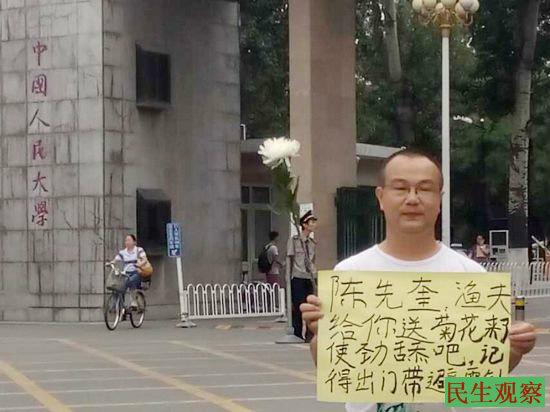
Beijing netizen “Fisherman” protested outside Renmin University against the promotion of party-state patriotism by a Marxist professor.
A Beijing netizen who goes by the name of Fisherman recently brought Marxism professor Chen Xiankui at Renmin University a Chrysanthemum. But the flower wasn't meant as a gesture of love or gratitude for the scholar. In traditional Chinese culture, Chrysanthemums are an for offering to the dead. In popular online usage, it also means “ass kissing.”
Fisherman and his flower were protesting Chen's opinion piece in Chinese Communist Party (CCP) mouthpiece Global Times stating that “patriotism and loving the party is the same” in contemporary China. Chen argued that treating love of country as separate from love of the communist party is a western idea that undermines the foundation of the one-party regime in China.
Chen's opinion is unacceptable to liberal-minded mainland Chinese people, like Fisherman. Twitter user @minshenguancha reported on the protest:
网民人大举牌 斥“爱国和爱党在中国是一致的”论 http://t.co/czBSsBcxHs pic.twitter.com/zaZKMV5ayo
— 民生观察 (@minshengguancha) September 11, 2014
Netizen shows protest placard in front of Renmin University to condemn the propaganda of “loving the country is the same as loving the party”.
The placard says: “Chen Xiankui: Fisherman is here to deliver the Chrysanthemum to you. Lick it hard. And remember to bring a lightning rod with you whenever you go out.”
One of the major fronts in the ideological battle launched by the new leadership of the CCP under President Xi Jinping is convincing Chinese to accept the idea that loving the country is equal to loving the party. Twitter user @xinyouqingbo explained the implication of Chen's patriotism theory:
总有一群御用文人甘冒矢石、自辱其祖的出来舔菊,还把所谓爱国的格调搞得如此低下,从政治上说,这不是破坏统一战线吗?不爱国从此变得如此容易,陈教授功莫大焉,可喜可贺。从此中国法律又有一个新罪行:不爱共产党=叛国。
— 心有清波 (@xinyouqingbo) September 10, 2014
One can alway find a group of intellectuals who are willing to act as shield and insult one's ancestor by licking [the party's] ass. They debase the term patriotism. And when judging from the perspective of political tactics, they are destroying the construction of a united front. Professor Chen has turned people away from their country so easily. A new crime will soon emerge: Not loving the party = treason.
On Twitter-like Weibo, Chinese netizens also spoke out against the blurred line between country and party. Below is a selection of comments from caijing's Weibo news thread:
张耀辉-从容中道:[…]“党”由西方导入,在中国不过一百年历史,若此教授逻辑存在,真不知古人如何爱国。
冬夜明月月1976:一个贪污腐败的利益集团也让我必须爱他!苏共垮台俄罗斯还在,罗共垮台罗马尼亚还在,柬共灭亡柬普寨还在,真无耻!
hitrust:建议大陆人一出生就拥有中共党籍,保证实现该类型逗比的想法
周末心情_木:党能等同于国??这是有多愚蠢!国是家,党是管家,你爱家还非要爱你管家?还无论如何不能换管家?
Zhang Yaohui: […] “Party” is a term from the west. Political party only has more than a century of history in China. According to Chen's argument, I wonder how people in the past loved their country.
“Winter moon 1976″: How can you compel me to love a corrupted interest group? Russia still exists after the Soviet Communist Party lost power. Romania still exists after the Romanian Communist Party lost power. Cambodia still exists after the Cambodian Communist Party lost power. Shameless [theory].
hitrust: I suggest that people born in mainland China automatically sign up as Chinese Communist Party members so as to make this kind of patriotism a reality.
“Weekend mood”: The party is the same with the country? This is so stupid. The country is home, the party is just a housekeeper. You don't need to love the housekeeper for loving your home. Can't you change the housekeeper?
Both “Sitting on the floor 2013″ from Weibo and @leo3194 from Twitter pointed out that Chen just described the reality:
席地而坐2013:他说的是真话,你只爱德国,不爱纳粹,在二战时的德国行不通的!
“Sitting on floor 2013″: What he said is true. You could not love Germany without loving the Nazis in Germany during second World War.
那个说爱国和爱党本就一样的人说的本来就是实话,反党分子和反华分子难道在党那里的标准不是一样的么。
— 奥哥–leo (@leo3194) September 11, 2014
The person who said loving the party is the same as loving the country just told the truth. In the eyes of the CCP, anti-party and anti-China are no different.
Chen's notion of patriotism is in line with mainland Chinese top official Li Fei's explanatory remarks on Beijing's framework for political reform in Hong Kong, a special administrative region of China. The mainland requires that candidates for Hong Kong's chief executive be endorsed by the majority of a pro-Beijing nominating committee before being allowed on the ballot for the city's first direct vote of their leader in 2017.
Li stressed that the ruling role of CCP is established in China's Constitution and thereby it goes without saying that the chief executive of Hong Kong should embrace the party-state. Pro-democracy activists are planning to challenge that thinking with a massive sit-in in the city's financial district to demand the right to choose the candidates.
The imposition of such an unpopular party-state patriotism onto the election system in Hong Kong will inevitably escalate the political conflict in the pearl city, where “East meets West”.







2 comments
The US and developed countries follow the directives of the economic elite and continue to sell what is left of their soul and their citizens welfare to the Communist Chinese government.
These wealthy oligopolist hypocrites don’t care what happens to the bottom 99.9995% as long as they get cheap labor to grow their wealth and power base. They have proven once again that they don’t care what political or economic system is in place, as long as they are able to gouge their power and wealth out of it.